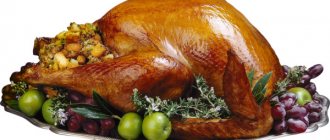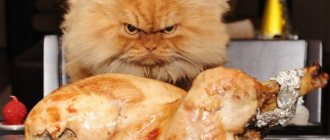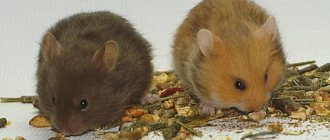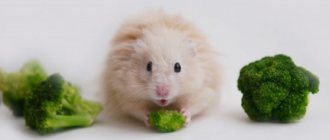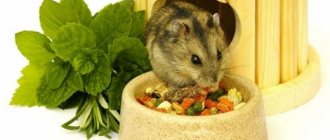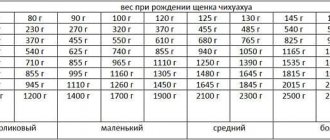What should you feed a dachshund puppy so that the inquisitive and flexible baby does not turn into a “fat sausage” with crooked legs? During adolescence, a dachshund puppy's skeleton grows rapidly and muscles form , so the baby must receive a sufficient amount of essential nutrients, vitamins and microelements. An important condition is to maintain the proportions of proteins, fats and carbohydrates so that your pet does not develop obesity and heart and joint pathologies.
Breed Features
Despite their short legs and unusual cute appearance, dachshunds are born burrow hunters with increased attentiveness, instant reaction and a balanced nervous system. An adult dog is distinguished by a calm character, impeccable obedience and submission to the will of the owner. Thanks to his extraordinary intelligence, this cute pet has been a favorite of many families for several centuries.
IMPORTANT!!! Dachshunds were favorites of Napoleon Bonaparte, who, when dying, left orders to bury the bodies of the adorable dogs in his grave.
The small dog has a loud voice, its menacing bark sounds scarier than that of many large breeds of dogs. A properly raised pet will not lunge at people or animals for no apparent reason. Despite its short stature, the animal copes well with the functions of a guard and protector of the family.
Basic feeding rules
Given the small stomach volume of a growing baby, it is customary to feed dachshund puppies in small portions several times a day . The frequency of feeding and the size of portions varies depending on age. It is advisable that the puppy has breakfast no earlier than 7 am and dinner no later than 10 pm, and equal time intervals between feedings must be observed.
Snacks between feedings are allowed only with tiny pieces of fruit as a reward; it is unacceptable to treat your dog with human food.
Remember! The habit of snacking on junk food leads to obesity, the development of allergies, pathologies of the heart and musculoskeletal system.
- A dachshund puppy can be fed with ready-made food or traditional food, but until the age of 3 months, giving your baby commercial food is prohibited.
- The main rule with a natural diet is to introduce a new product into the menu of a small pet from a very small amount with a gradual increase in volume.
Choosing a place and utensils for feeding
Most often, small puppies eat so actively that liquid and dry food contaminants remain on the walls and floor of the feeding area. Considering the likelihood of constant cleaning, it is better to feed your cute baby in non-residential rooms - the kitchen or bathroom.
The place for feeding should be the only one and constant for the entire life of the small pet, so the issue of choosing a place and utensils for feeding must be taken care of even before acquiring a little friend.
Very young dachshund puppies can be fed from a small saucer. As the pet gets older, its muzzle will stretch out, so the grown-up baby will need to be fed from a deep bowl.
It is recommended to immediately purchase two bowls: one for food, the other for water. After each feeding and in the evening, you need to wash both bowls in running water.
- You should not buy ceramic bowls
- Plastic dishes for a dachshund should be made of high-quality durable material so that the dog cannot chew it while changing teeth.
- The optimal dishes for dachshunds are stable, deep bowls made of stainless steel. This material is strong, durable and hypoallergenic.
What to feed a dachshund puppy
Today, there are two main feeding schemes for puppies: natural diet and ready-made food. Veterinary specialists focus on using traditional food specifically for raising babies; breeders and dog handlers are more inclined to use high-quality ready-made food.
Both feeding schemes have their pros and cons, so what to feed the dachshund puppy is up to the owner of the cute pet to decide.
Natural diet
If the owner of the puppy has decided to raise the baby on a natural diet, he will need to prepare fresh food from high-quality products several times a day. It is very important to correctly observe the proportions of nutrients. Given the propensity of dachshunds to allergies, it is necessary to monitor the dog’s reaction to each newly introduced product.
The following products are suitable for feeding:
- Meat – beef, veal, turkey, lamb. Chicken often causes allergies in Dachshund puppies, so it can only be introduced with control of the allergic reaction.
- By-products – boiled beef liver, kidneys, heart, stomach.
- Boiled sea fish without bones - cod, blue whiting, pink salmon.
- Milk. Many dachshunds cannot digest whole milk, so you can replace it with fermented milk products. If milk is digested well, it is given only up to 4 months of age.
- Fermented milk products - cottage cheese, fermented baked milk, kefir, yogurt, calcined cottage cheese.
- Eggs are given to babies raw or boiled.
- Cereals . From a very early age, babies are fed semolina, rice, oatmeal, barley and buckwheat milk porridge. Porridge is boiled in water and diluted with warm meat broth.
- Vegetables, fruits, and herbs are given raw or boiled with a small amount of vegetable oil and nuts. Dachshunds happily eat carrots, zucchini, bell peppers, pumpkin, beets, cauliflower, apples, pears, berries, dill, parsley, and cilantro.
- Additives - cheese, seaweed, salt, vegetable oil, bran, rye bread or flour.
Ready-made feed
Despite the recommendations of veterinary specialists not to use dry food for raising puppies, most breeders and dog trainers successfully raise healthy dogs on ready-made food.
If a dog owner decides to feed a small dachshund with industrial food, he should pay attention to the line of low-calorie food for puppies of small breeds of dogs from the super-premium class.
High-quality food has a balanced, carefully verified composition and a full range of vitamins and microelements; it is easy to give according to the dosage indicated on the packaging. When using industrial food, the owner spends a minimum of time preparing and cleaning the room after feeding the pet.
The disadvantages of high-quality food are their high cost and the content of carcinogenic substances that negatively affect the health of a small dog.
Advice: You should not purchase a large amount of dry food at once because of the possible manifestation of an allergic reaction in the baby.
Mixed diet
The mixed diet is a source of controversy among experts and amateurs, but it is very often used by eminent breeders to raise healthy dogs. With this diet, you cannot mix dry food and natural products in the same bowl at the same time due to the different mechanisms of their digestion.
Dachshund food
The first owners of dachshunds prefer to feed the dogs with special food. Firstly, it is convenient; the food does not require additional preparation. Secondly, dog food manufacturers create food for dogs based on their needs and preferences.
The latter are of the opinion that the dachshund should eat exclusively natural products, and feed the dogs food from the table. When forming a dachshund’s diet, it is worth considering what the puppy ate while at the breeder. It is advisable that the dachshund puppy that is brought home eats the same food as the breeder. This will prevent the occurrence of allergic reactions, and the new owner will help the puppy cope with worries about his new place of residence.
Having finally decided what to feed your dachshund, begin to gradually accustom the dog to the chosen food.
The transition from the first type of nutrition to the second occurs slowly. You cannot immediately replace the food with an acceptable one. First, replace a single meal with another food. Gradually, the volume of new food per day increases, and the amount of old food decreases. It is important not to mix or feed specialized food and natural products at the same time.
Sample dachshund puppy menu by age
With a natural diet, meat and fish make up 50%, 20% vegetables, 20% dairy products, 10% porridge. Let's look at a sample menu for a dachshund puppy by age.
Up to a month
Up to a month, the cubs feed 6 times a day with mother's milk. From 3 weeks, one feeding can be replaced with rice or semolina porridge with milk, low-fat cottage cheese with kefir or meat baby food.
It is necessary to give new food on an empty stomach, immediately after sleep. Porridge and cottage cheese are given 30 g each, meat puree – 5-10 g.
1 month
At 1 month, buckwheat, carrots and boiled meat are introduced into the little friend’s diet. Meat can be given boiled and twisted with porridges or as part of thick soups. It is recommended to grate carrots on a fine grater and mix with a small amount of vegetable oil. Every day the puppy is given cottage cheese, kefir, porridge, meat and vegetables.
Advice! You can make a healthy and tasty toy from whole carrots.
A one-month-old baby should receive 50 g of fermented milk products and cereals, 30 g of meat and 20 g of vegetables.
2 months
At 2 months, the puppy already eats 5 times a day, the baby begins to try new foods: spaghetti, noodles, rye bread, grated cheese, cabbage, bell peppers, zucchini, pumpkin, apples, pears. Every day you can introduce one new product while monitoring the reaction of the puppy’s body.
A two-month-old puppy can eat boiled and raw eggs no more than 2 times a week. A raw egg can be given with cottage cheese or milk, a boiled egg can be mixed with porridge.
Daily intake for a two-month-old puppy: 40 g of meat, 100 g of dairy products, 70 g of cereals, 70 g of vegetables.
3 months
At 3 months, 4 meals a day are introduced; the puppy can be given boneless sea fish in the form of small meatballs. The pet continues to eat cereals, soups, vegetables and meat. A three-month-old dachshund can try raw beef or veal with 2 g, gradually increasing the portion. Lamb, turkey and chicken are boiled and twisted, served with cereals, vegetables and herbs. Also, bran and seaweed are added little by little.
At 3 months, the puppy receives 60 g of meat, 250 g of dairy products, 100 g of cereal and 100 g of vegetables.
Meat component
Tenderloin, cue ball and other delicacies are not the best option for a dog. Dachshunds need meat with veins, for example, trimmings from the head. It should not be greasy or spoiled. Beef, turkey, lamb and chicken are the staple foods for dachshunds.
Important: Chicken skin is not given to dogs because it is oily and often causes allergic reactions.
Meat in a dachshund's diet should be 30-60%. By-products in the form of beef tripe, heart, chicken liver, stomachs and hearts are useful. They are given raw or lightly boiled. The exception is scar.
Vitamins and supplements
Up to a year, the formation of bones, teeth and muscles occurs, so it is very important that the growing baby’s body is provided with vitamins and microelements in order to avoid the development of rickets and pathologies of the musculoskeletal system.
If the puppy eats ready-made super-premium food containing yeast, omega-3 acids, vitamins and mineral supplements, then the owner does not have to buy additional expensive medications.
A natural diet, especially in winter, is not able to meet the vitamin needs of a small dog. They are produced in liquid and dry form, premixes are mixed with the main food and fed to the kitten.
Vitamin supplements for a puppy
Vitamin and mineral balance is very important for the body of any living creature. If the basis of a dachshund’s diet is dry food, then there is no need to supplement it with other supplements; its composition is balanced. But natural feeding requires an additional approach, since an imbalance of nutrients has a detrimental effect on the dog’s internal organs.
A nutritionist can prepare the correct diet; he will also select the necessary vitamin supplements and calculate their quantity.
Water
When raising a dachshund puppy, close attention must be paid not only to the freshness of food and the brand of finished food, but also to the quality of drinking water. Musty or stale water can cause intestinal disorders and even death in growing plants. Up to a year, it is advisable to give your beloved pet filtered or bottled water, which must be changed 2-3 times a day.
Before pouring a new portion of fresh drink, it is necessary to thoroughly rinse the bowl under running water to wash off the remaining liquid with the animal’s saliva and pathogenic microflora.
When raising a short-legged pet exclusively on dry food, a lack of fluid leads to the development of urolithiasis, so it is recommended to monitor the filling of the dishes with water.
Rating of the best dry food
There are dry dog foods available for sale in a variety of sizes and breeds. It is necessary to carefully study the composition of the proposed product, its type and nutritional value.
All ready-made mixtures can be divided into 4 groups:
- Economy class. These are the cheapest foods that do not contain real meat. They contain by-products, fillers, soy, corn, preservatives and flavor enhancers. List of economy class feeds:
- Cesar;
- Pedigree;
- Darling.
This is interesting: Composition and advantages of pedigree food
- Premium class. These are popular feeds in Russia. They contain meat. The main component is rice. The most famous brands:
- Probalance;
- Royal Canin;
- Hills.
- Super premium. These foods consist almost entirely of meat. They do not contain preservatives or flavor enhancers. These include such “drying” as:
- 1st Choice;
- Trainer;
- Josera;
- Monge.
- Holistics. This product is considered the highest quality product for dogs.
The best food for dachshunds:
| Name | Compound | Price in rub. |
| Chibau | Meat, vegetables, fruits, medicinal herbs, vitamins | From 1200 |
| Dark Forest | Potatoes, meat, vegetables, fruits, mineral complexes | From 1400 |
| Canin Holistic Dark&Potato Adult Dog | Meat, offal, rice, beets, potatoes, amino acids, vitamins | From 1500 |
| Guabi Natural | Several types of meat, rice, fish, rosemary, minerals | From 800 |
| Summit | Meat, oatmeal, rice, broth, fish, vegetables, fruits | From 2000 |
Prohibited Products
A dachshund prone to obesity and allergies should not be fed the following prohibited foods:
- Any sweets: chocolate, candies, cakes. These products cause allergies and poisoning in very young pets.
- Tubular bones of poultry and rabbit, any boiled bones. Splinters of tubular bones can perforate a dog’s intestines and cause death of the animal. Boiled bones lead to constipation and enterocolitis.
- Sausages because they contain nitrate, a substance that causes degenerative changes in the liver.
- Onions and garlic, which can cause stomach ulcers.
- Salty, sweet, spicy, pickled foods that the dog’s liver cannot handle.
- Pork, kebab, fried and fatty foods, leading to cirrhosis of the liver.
- Potatoes, which can cause obesity and diabetes.
- Human food, spoiled food.
- Grapes, citrus fruits, mushrooms.
Composition and nutritional standards
When creating a menu, you need to take into account the characteristics of the animal’s breed. His weight should be constantly monitored. It should be no more than 9 kg. Exceeding the recommended norm leads to obesity.
A dachshund's diet also depends on the time of year. In summer, the dog moves a lot, energy expenditure is higher. Therefore, food should be more nutritious. During the cold season, you need to reduce the amount of carbohydrates in your food.
Expert opinion
Anna Abramenko
An avid dog lover. Experience in veterinary medicine since 2009.
Ask a Question
In autumn and winter, dogs are susceptible to vitamin deficiency. Therefore, during the cold season, it is recommended to add additional vitamins to the dachshund’s food, which only a veterinarian has the right to prescribe.
The basis of the dachshund's diet is meat. It should be 30-60% of the total amount of food. Veal, turkey, beef are recommended. For dogs, it is better to choose coarse pieces with veins.
You should not let your dachshund chew on long bones. They can damage her internal organs.
Organ meats (liver, kidneys, lungs, tripe) and fish are sources of protein and are essential for dogs. But you should give them to your dachshund only in boiled form.
Cereals should make up 20-40% of the daily diet. In addition to buckwheat and rice, you can occasionally give your animal other types of cereals. They contain additional trace elements and minerals. But it is advisable to remember the main thing:
- rolled oats should be steamed with boiling water, but not boiled;
- millet can cause loose stools in a dog;
- beans and peas contribute to bloating;
- The dachshund's stomach does not digest pearl barley well.
As for fruits, it is recommended to give dogs apples, pears, and dried fruits.
The menu is also diversified with products that can and should be added to the diet: kefir, fermented baked milk, yogurt, eggs. Among baked goods, only rye crackers are recommended for dachshunds.


